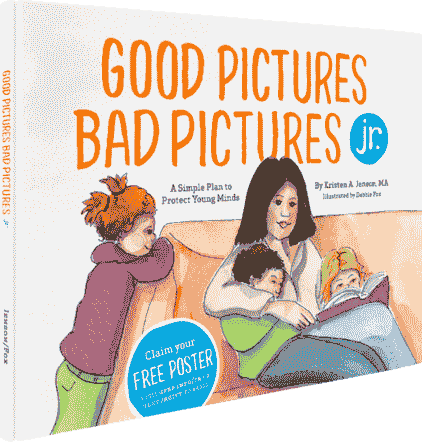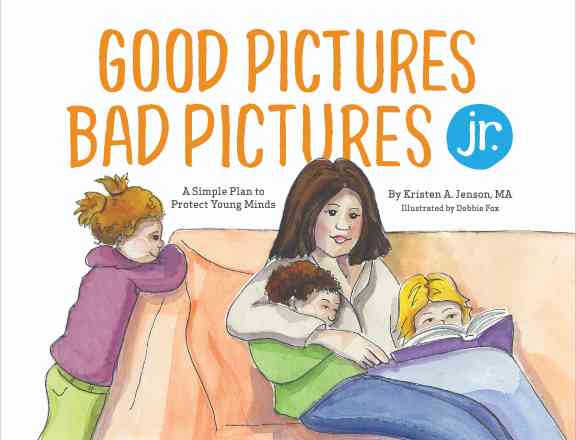.jpg)
.jpg)
How to Talk to Kids About Porn: 7 Top Tips for Savvy Parents
Talking to kids about porn can feel uncomfortable. Yet to help keep kids safe online, every parent needs to warn and educate their kids about its dangers. If they don’t, kids are left to the predatory wolves of the porn industry who are looking to create an addicted customer for life.
We understand the discomfort these conversations might cause. But fear not! These 7 tips are designed for savvy parents like you to make talking to your kid about porn easier.
BONUS TIP: Do you have a parent group, book club or small group you belong to? Use this article as a study guide for a series of empowering discussions.
.jpg)
1. Get the facts – motivation over fear
Understanding the impact of pornography is essential for parents. Rather than succumbing to fear, be prepared with and motivated by facts. Knowing the facts equips parents to approach the conversation with confidence.
Learn the facts
- 11 Top Ways Porn Will Target Your Kids in 2024
- Today’s Porn Industry: 5 Things Every Parent Needs to Know
- Kids Hurting Kids! 3 Ways Parents Can Reduce the Risk of Child-on-Child Harmful Sexual Behavior
The Good Pictures Bad Pictures books serve as a comfortable tool to initiate discussions with kids about the dangers of pornography.
2. Push past discomfort and ditch shame
Overcoming the discomfort associated with discussing porn is crucial. Pornography entices kids by activating a very normal and strong part of their brain—their sexual center. It is entirely normal for a child to be curious about seeing naked people. Shame can hinder children from disclosing their experiences and seeking help.
TIP: It's important to emphasize that pornography is harmful or bad for kids, rather than labeling people who are trapped by porn as “bad.”
Our free guide How to Talk to Kids About Pornography offers tips for making the conversation comfortable. Download your free copy here.
Learn how to ditch shame
- It’s Awkward, and It’s OK: You CAN Talk to Your Kids About Pornography
- Overcoming Shame: 4 Tips for an Emotionally Safe Home
- Mom Guilt? 8 Tips to Overcome Shame When Your Child Sees Porn
3. Start early – sooner is safer
Kids’ brains are hard-wired to explore their world and imitate what they see adults do. That’s exactly why parents need to talk to their kids about pornography sooner rather than later. We live in a world saturated by hyper-sexualized media, so your kid’s curiosity will be awakened earlier than you might suspect. And they have unprecedented access to the internet to go looking for answers. The truth is that parents have two choices:
1. They can cross their fingers and hope that their child won’t be exposed until AFTER they begin talking with them about the harms of pornography.
2. OR parents can be proactive and open the conversation to begin empowering their kids to reject pornography as soon as they have any access to the internet.
The best age to begin talking to a child about porn is when they first have any access to the internet. They deserve to be warned early against its dangers.
Good Pictures Bad Pictures Jr.: A Simple Plan to Protect Young Minds provides an age-appropriate definition, warning, and plan, making it a valuable resource for parents to start the conversation with young children, ages 3-6.
Learn why sooner is safer
- “Will I Rob My Child’s Innocence If I Start Talking about the Dangers of Porn?”
- Will the Porn Talk Arouse Curiosity in Kids? 5 Solid Reasons to Overcome Your Fear and Start Now
4. Give age-appropriate definitions
Being able to recognize pornography is the first line of defense, therefore offering children an age-appropriate definition of pornography is key. Resources like the Good Pictures Bad Pictures books provide clear definitions, warnings, and plans. These tools empower children to recognize, reject, and report exposure to porn.
Learn age-appropriate definitions
- How to Talk to Kids About Pornography (free downloadable guide)
- 3 Steps to Give Kids an Internal Filter
[[CTA]]
5. Give them a warning – reasons to reject porn
Educate children on the reasons to reject pornography. Emphasize the dangers of addiction, objectification, and threats to body safety. This gives kids a warning and good reasons to reject pornography.
Learn warnings to give kids
- 5 Proven Ways Porn Harms Kids that No One Talks About
- Can Using Porn Physically Change the Brain? Neurosurgeon Breaks It Down
- How Porn Corrupts the Brain’s Reward System: Neurosurgeon Explains
- Baffling Irony! In an Age of Female Empowerment, Porn Normalizes Rape and Sexual Abuse of Women
6. Teach a ready-response plan
Give your child a plan for rapid response to porn exposure. It should include specific steps to address the initial exposure, and minimize recurring, distressing memories.
Families can create their own personalized plan. Or use our research-based options in the Good Pictures Bad Pictures books:
- “Turn, Run and Tell” plan in Good Pictures Bad Pictures Jr.: A Simple Plan to Protect Young Minds
- “CAN DO Plan” in Good Pictures Bad Pictures: Porn-Proofing Today’s Young Kids
Having a solid plan and reviewing it often will help kids reject porn, foster open communication, and provide reassurance that parents are ready to address any concerns.
7. Continue the conversations
Recognize that the “porn talk” is not a one and done conversation. Convos about porn need to be ongoing. The prevalence of digital content means that children may encounter porn frequently. Stay engaged, be open to questions, and provide continuous mentoring as they navigate the digital landscape.
Learn more to keep those conversations rolling
Subscribe to our weekly emails
Follow us on our social pages: Instagram, Facebook, X, LinkedIn
Brain Defense
In addition to these seven tips, our Brain Defense: Digital Safety curriculum offers a comprehensive program to teach kids a variety of digital defense skills. Developed for children ages 7 to 11, this program covers topics such as:
- recognizing, rejecting, and reporting exposure to porn,
- establishing healthy tech habits,
- dealing with online bullying, and
- learning to be kind and honest in digital spaces as well as in real life.
Empower kids
Proactive discussions and continuous mentoring play a pivotal role in helping children navigate the digital world and reject harmful messages. Start talking with your kids about porn while they still see you as a credible source of information. Be proactive in shaping their attitudes about healthy sexual relationships and their counterfeits in the media and online. Any amount of time you invest in this will bring you excellent returns in your child’s future happiness.
.jpg)


Good Pictures Bad Pictures Jr.
“I highly recommend this book to all people with children. A must have for all parents!” —Amazon Review
.jpg)
.jpg)





